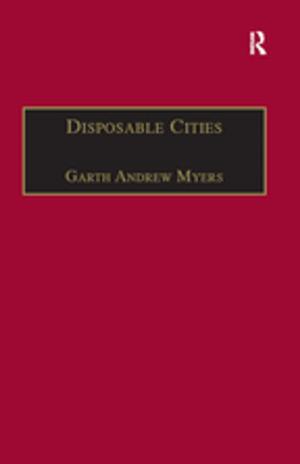| Author: | Luigi Mazza | ISBN: | 9781317378228 |
| Publisher: | Taylor and Francis | Publication: | September 25, 2015 |
| Imprint: | Routledge | Language: | English |
| Author: | Luigi Mazza |
| ISBN: | 9781317378228 |
| Publisher: | Taylor and Francis |
| Publication: | September 25, 2015 |
| Imprint: | Routledge |
| Language: | English |
Planning is undergoing a period of profound change and risks losing meaning and authority by becoming merely a tool for financial speculation and generating capital. Planning and Citizenship seeks to rediscover planning’s technical and theoretical roots by reconstructing the memory of planning through the lens of the changing relationship between planning and citizenship.
Tracing the historical relationship between planning and citizenship through a single thread, Luigi Mazza employs three ancient models – those of Hippodamus, Romulus, and Ancient China – to understand the foundations of spatial governance and citizenship. Paying particular attention to classic case studies of American cities, this book moves through the development of central planning theories by key thinkers like Geddes, Cerdà, Howard, Abercrombie and Lefebre. Analysing the role of government in promoting social citizenship and symbolic values through planning, Mazza takes into account the changing role of government in planning, including concepts of neoliberalism and the minimal State.
Providing critical debate over the current role of spatial governance in planning and citizenship, Planning and Citizenship offers a unique historical analysis of a crucial topic in planning.
Planning is undergoing a period of profound change and risks losing meaning and authority by becoming merely a tool for financial speculation and generating capital. Planning and Citizenship seeks to rediscover planning’s technical and theoretical roots by reconstructing the memory of planning through the lens of the changing relationship between planning and citizenship.
Tracing the historical relationship between planning and citizenship through a single thread, Luigi Mazza employs three ancient models – those of Hippodamus, Romulus, and Ancient China – to understand the foundations of spatial governance and citizenship. Paying particular attention to classic case studies of American cities, this book moves through the development of central planning theories by key thinkers like Geddes, Cerdà, Howard, Abercrombie and Lefebre. Analysing the role of government in promoting social citizenship and symbolic values through planning, Mazza takes into account the changing role of government in planning, including concepts of neoliberalism and the minimal State.
Providing critical debate over the current role of spatial governance in planning and citizenship, Planning and Citizenship offers a unique historical analysis of a crucial topic in planning.















